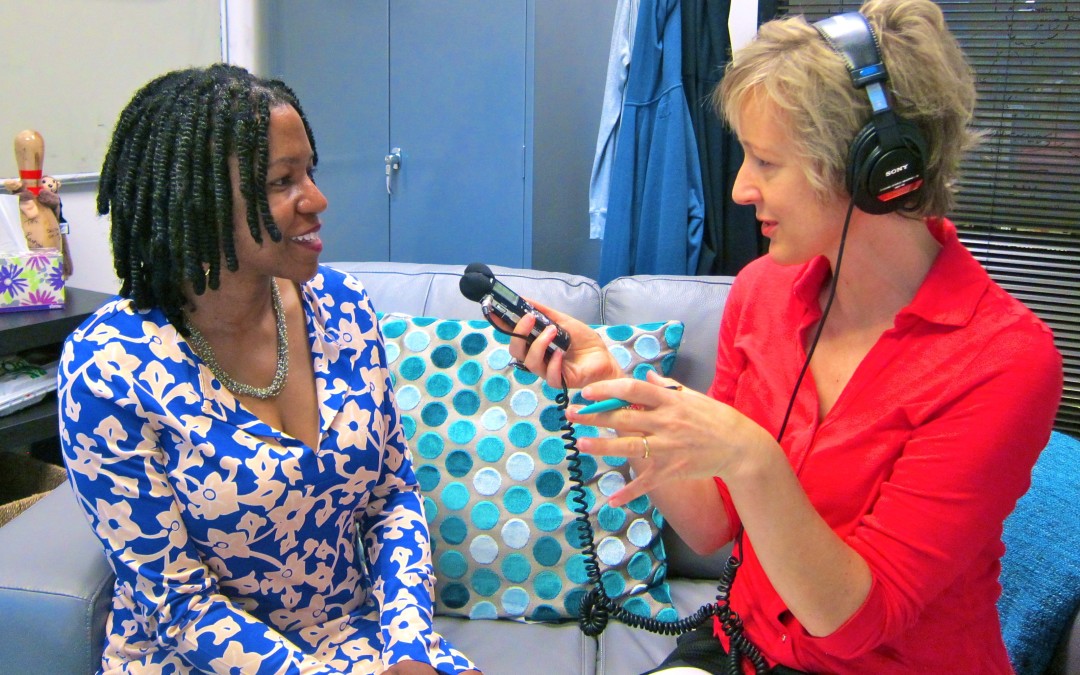By Alison van Diggelen, host of Fresh Dialogues
What’s it like to be a black female CEO in Silicon Valley? How should you handle a powerful backlash when your company does a major pivot? I explored both issues with TaskRabbit CEO, Stacy Brown Philpot and my interview aired last night on the BBC World Service program Business Matters.
BBC host Roger Hearing, Seoul Bureau Chief for the Economist Stephanie Studer and I had a lively conversation about the gig economy, as well as fashion fumbles (like cargo shorts) and cool alternatives (like utility kilts).
Listen to the podcast at the BBC (Episode titled: Bank of England Lowers Interest Rates): TaskRabbit segment begins at 26:46
Or listen to the TaskRabbit segment below:
Here’s a transcript of our conversation (edited for length and clarity)
Roger Hearing: Alison, I know you’ve been looking into something that is a strange concept: the gig economy. Tell us, what is the gig economy?
Alison van Diggelen: It’s been borrowed from the music industry, Roger. Workers who work in the gig economy don’t have regular full time work, but work in “gigs” like at Uber, Lyft, AirBnB, Etsy, Upwork and TaskRabbit. I’ve been speaking with Stacy Brown-Philpot. She’s the CEO of TaskRabbit. It’s a website and app that matches job seekers with jobs – like house cleaning, shopping, delivery and handyman jobs.
It was founded in 2008 and was one of the first companies in the gig economy. Stacy told me how the company launched its international operation in London in 2012, and it did a pivot. It changed its “bidding for a job” model to a “direct hire” approach. This was a huge success in London but when they tried it back in the United States, they faced a severe backlash from contractors here. Yet, they stuck to their guns and last year the business grew 400%.
I first asked Stacy what advice she would give to other businesses about staying the course, when they try to pivot and face similar challenges.
Stacy Brown-Philpot: Know exactly what it is that you are focused on and don’t lose track of that. Stay laser-ly focused on what that goal is…despite the noise that comes into the market place, stay focused and believe more than anyone else and you can get there.
Alison van Diggelen: There are a lot of critics of the on-demand economy saying that it doesn’t offer a living wage, benefits to workers…this whole “Uber issue” of independent contractors not employees…Can you give me your perspective?
Stacy Brown-Philpot: Our Taskers are independent contractors – they can work in a flexible way and that is the No.1 reason why they stay. We have a very low churn: 10%. The flexibility that we’re able to offer our Taskers is unparalleled and necessary.
What needs to happen is that the regulations and policy has to change…to support the sharing economy. When you look at structures we’re working under…these were created in the 1900’s and they no longer apply…we need something that adapts to the technology-enabled businesses that we operate under today.
Alison van Diggelen: What specifically would you like to see as far as regulation change?
Stacy Brown-Philpot: One of the tradeoffs we face is the ability to offer training and more transferable skills to our taskers…We’d love to see regulations evolve to support that. We’d also love to see opportunities to access healthcare and retirement.
We empowered this community to create a social safety net for Taskers who really want the flexibility to work in a meaningful way, so we have a responsibility to also partner with them to do other things like have health care and retirement savings.
Alison van Diggelen: Let’s talk about diversity – you’re a rare person, you’re black… you’re a female CEO in Silicon Valley. Talk about the pros and cons of that.
Stacy Brown-Philpot: The pro is that I stand out…whenever I walk into a room and try to meet somebody…I say: trust me, you’ll find me…you’ll see who I am. (laughter)
But the con is that I stand out. Sometimes I look around and wish there were more people who look like me. At TaskRabbit over 58% of our staff are women, we have 11% African Americans – It’s a stated goal to increase those numbers. I feel a responsibility – just to feel more welcome wherever I go – to increase those numbers, and encourage everybody in our industry – not just for the sharing economy – but the tech industry overall to do the same.
Alison van Diggelen: What specifically do you do?
Stacy Brown-Philpot: We have goals around targets that we measure in hiring, so whenever we bring someone in that we want to hire, we want to make sure that population of people we’re interviewing is a diverse population of people. We also do things culturally in terms of our off-sites and events to make sure everybody can bring their whole selves to work because many of our new hires come from referrals….if you feel you can bring your whole self to work and bring someone who’s different and they be a great candidate for the company. (Brown Philpot also told me TaskRabbit has teamed with the Congressional Black Caucus to help increase the company’s diversity.)
Alison van Diggelen: Talk about your wildest dreams for where TaskRabbit can be in 5-10 years?
Stacy Brown-Philpot: Task Rabbit should exist everywhere in the world. We’re creating everyday work for everyday people – this is a phenomenon that is global and so I want to be global as a company. Millions of families are time starved, countless people are looking to find work, and they’re looking for an opportunity for growth and creating a meaningful income. That’s an economic responsibility that we take seriously. We’re shaping the future of work.
Roger Hearing: Does it change the future of work? These kinds of companies: Uber, Etsy etc?
Alison van Diggelen: There’s a lot of anecdotal evidence… and according to the US Census, the gig economy was the fastest growing employment sector last year. A study by Intuit predicted that by 2020, 40% of American workers will be these independent contractors – it’s currently about 30% – and this will have knock-on effects. Here in the U.S. we don’t have a national health service so these people working these gig economy jobs don’t have health benefits through their employment, so there are things that will have to change.
Roger Hearing: It hasn’t all been roses, as you alluded to in the interview. There was a revolt against TaskRabbit. Tell us more about that…
Alison van Diggelen: They originally had a bidding process and the Taskers felt they had more control that way. After trying out this new on-demand service they got a huge backlash. They learned a lot of lessons -one of which was: you can’t overdo the communications. A lot of people didn’t understand the changes. Stacy Brown Philpot worked previously at Google for almost 10 years and she used her product experience there to stay the course. She recalled when a new version of Gmail came out, people hated it and hated Google for introducing it…People are opposed to change she found.
In the end, they’re saying the Taskers benefited and TaskRabbit benefited and it was a win win. It was a vocal minority who opposed the change.
***
Continue listening for more discussion…
The Economist’s Stephanie Studer explains why Uber was effectively banned in South Korea and why gig economy companies like TaskRabbit may face cultural and other challenges if they try to launch in the region. We also discussed trust and safety issues; and what TaskRabbit is doing to ensure Taskers are trustworthy and reliable.
And finally, Roger Hearing explored the business fashion trends in London, Silicon Valley and Seoul and was surprised to learn about the popularity of the utility kilt here in the San Francisco Bay Area. 
Find out more
Meet more strong female leaders like Instagram COO Marne Levine and Wholly H2O’s Elizabeth Dougherty from our Fresh Dialogues Inspiring Women Series




